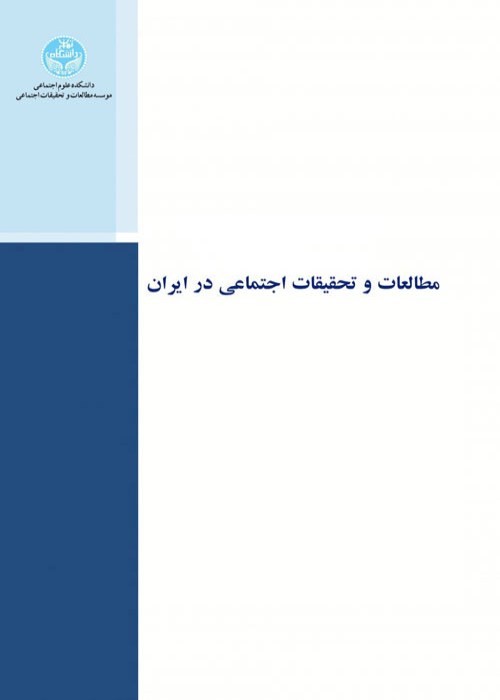Analysis of Factors Influencing People's Coping with the Covid-19 Pandemic with Special Reference to Religiosity and Social Indifference
Author(s):
Article Type:
Research/Original Article (دارای رتبه معتبر)
Abstract:
Introduction
As an unprecedented crisis, the Corona virus outbreak has upset many current aspects of human life in a very sudden and widespread way. This highly contagious disease, more than any other epidemic, has various cultural and social consequences, affecting all aspects of social life. This study examines the social factors that influence how people cope with Covid-19 disease. The study focuses on religiosity and social indifference as social components that influence people’s response to Covid-19 in the dimensions of behavior, emotion, and attitude. The theoretical framework of the present paper is based on religious coping theory, according to which religious people face human crises in a wiser and more relaxed manner. According to the religious rationalism approach, religious tendencies play an effective role in shaping people’s responsible behavior in the face of Covid-19 disease.Method
This study was conducted by using a survey in which data were collected by a questionnaire. The statistical population of this study was all people living in Tehran city, and 300 people were selected as the research sample by a cluster method appropriate to the size. The method consisted of first considering each of the 22 districts of Tehran as a cluster. Then, according to the population of each cluster, a number of areas were randomly selected from each of them. Finally, blocks were randomly selected in the selected areas, and within each block, a number of households were selected using a simple random sampling method. In the sample selection, the percentage of randomly selected individuals from each group was equal to the percentage of the same group in the target population.Findings
The results show that most of the respondents, 34.4%, have a college degree and most of them, about 30%, are students. Regarding the context variables, there is no significant relationship between the “Facing the COVID -19” index and the marital status of the individuals. Of course, women are slightly more likely than men to follow health tips and social distance. On the other hand, there is a significant relationship between this index and the level of education; that is, as the level of education increases, people show better behavior toward coronary disease. The average value of the “Facing the COVID -19” index is 4, which means that the respondents largely follow the health recommendations. The mean score of the sample population for “religiosity” is 3.48, indicating a relatively high level of religiosity. The percentage of “social indifference” in the sample is almost low. Thus, 46.2% of individuals have low indifference and 19.8% have very low indifference. The results of the multivariate regression test show that there is a significant relationship between the index “Facing the COVID-19” and independent variables in different dimensions (R = 0.427). The results of this study show that there is an indirect relationship between “social indifference” and “Facing the COVID-19” (B = -0.268); when social indifference increases among people, they follow less health advice. “Religiosity” also has a direct effect on the management of Covid-19 disease (B = 0.242), such that religious people try more than others to show responsible behavior in dealing with this disease.Conclusion
Two main research hypotheses were confirmed. According to them, the strongest significant relationship between “Facing the COVID-19” and independent variables is associated with the “social indifference” index (r = -0.365). This shows that with the increase of social indifference among people in society, the level of compliance with health protocols among them has decreased and these people act more negligence in the face of corona. On the other hand, by decreasing indifference and increasing social responsibility, people will be more reasonable and responsible to corona disease. On the other hand, there is a significant positive correlation between Facing the COVID-19 and religiosity (r = 0.347). This finding confirms another hypothesis of the study and shows that religious people follow the principles of social distancing more than others. The higher people’s religiosity, the better they behave in terms of health advice during corona outbreak.Keywords:
Language:
Persian
Published:
Quarterly of Social Studies and Research in Iran, Volume:11 Issue: 2, 2022
Pages:
429 to 459
magiran.com/p2456032
دانلود و مطالعه متن این مقاله با یکی از روشهای زیر امکان پذیر است:
اشتراک شخصی
با عضویت و پرداخت آنلاین حق اشتراک یکساله به مبلغ 1,390,000ريال میتوانید 70 عنوان مطلب دانلود کنید!
اشتراک سازمانی
به کتابخانه دانشگاه یا محل کار خود پیشنهاد کنید تا اشتراک سازمانی این پایگاه را برای دسترسی نامحدود همه کاربران به متن مطالب تهیه نمایند!
توجه!
- حق عضویت دریافتی صرف حمایت از نشریات عضو و نگهداری، تکمیل و توسعه مگیران میشود.
- پرداخت حق اشتراک و دانلود مقالات اجازه بازنشر آن در سایر رسانههای چاپی و دیجیتال را به کاربر نمیدهد.
In order to view content subscription is required
Personal subscription
Subscribe magiran.com for 70 € euros via PayPal and download 70 articles during a year.
Organization subscription
Please contact us to subscribe your university or library for unlimited access!


